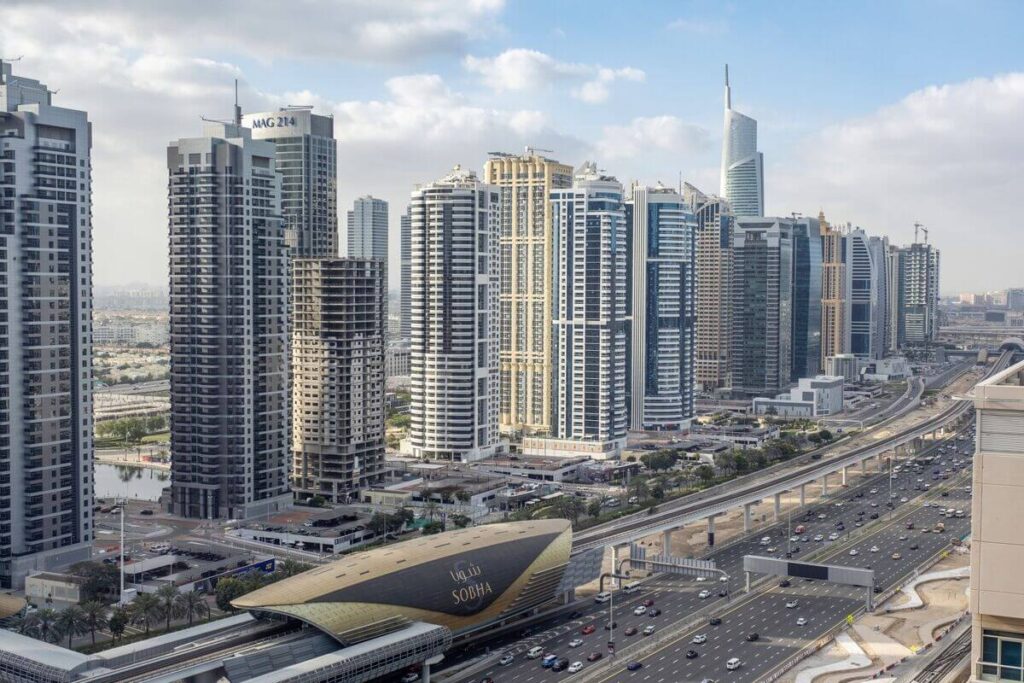The property industry in Dubai, which has long been renowned for drawing in high-net-worth people and international investors, is currently undergoing a structural change as a result of the revolutionary project.
Due to the introduction of the First-Time Home Buyer Program in July 2025, transactions in Dubai’s real estate market topped Dh90 billion in July and August, representing an increase of about 12% year over year, according to figures from the Dubai Land Department.
The plan has given the market new impetus by providing opportunities for Emiratis and foreigners who previously thought homeownership was out of reach.The program, which is being led by the Department of Economy and Tourism (DET) and the Dubai Land Department (DLD), is already being praised as a revolutionary development for Dubai’s housing market.
Fundamentally, the program gives prospective homeowners first dibs on new products, exclusive rates, and customized mortgage options. From industry titans like Emaar, Damac, and Nakheel to up-and-coming firms like Binghatti and Danube, participating developers have committed to giving at least 10% of apartments in new and ongoing projects priced under Dh5 million to first-time purchasers.
This pledge aims to make it easier for middle-class households, a group that has historically been hampered by sharp price increases, to enter the market. Banks such as Mashreq, Emirates NBD, and Dubai Islamic Bank have also introduced customized financing products with reduced interest rates, quicker approvals, and flexible repayment options.
Officials emphasise that the programme aligns seamlessly with Dubai’s Real Estate Strategy 2033 and the broader Economic Agenda D33, both of which aim to double the emirate’s GDP and increase homeownership rates. “By lowering entry barriers to homeownership for Emiratis and expatriates alike, we are enhancing investor confidence, increasing market absorption rates, and reinforcing Dubai’s global positioning as a city where personal aspirations and business ambitions converge,” said Helal Saeed Almarri, director general of DET, at the launch event.
Reshaping the market narrative
Smaller off-plan apartments, especially one-bedroom and studio units in developing neighborhoods like Jumeirah Village Circle, Dubai South, and Al Furjan—areas that are being heavily promoted under the first-time buyer scheme—accounted for a sizable portion of this surge, according to analysts. Inquiries from residents who had previously rented increased by 15%, according to Betterhomes, who attributed their choice to buy to the program.
“Just two months since its launch, the First-Time Home Buyer Programme has already reshaped the market narrative. It has bolstered transaction volumes, attracted thousands of new entrants, and reassured developers wary of oversupply,” said V. Sivaprasad, chairman of Condor Developers.
Meanwhile, V.S. Bijukumar, a Dubai-based property consultant, added: “Most importantly, it signals a maturing real estate sector that balances global capital with local aspirations, ensuring Dubai remains one of the world’s most competitive cities to live, work, and invest.”
Tenants-focused scheme
The plan is especially attractive to tenants. Rents in Dubai have increased recently; by mid-2025, average yearly apartment rents will reach Dh85,000, while villa rents will reach Dh190,000. Mortgage-backed ownership is becoming a more affordable option than long-term rental, particularly with flexible payment plans and discounted DLD fees that must be paid in installments. By successfully converting long-term tenants into end users, the program lessens reliance on speculative investment and promotes market equilibrium.
In the meantime, developers see the initiative as a stabilizing force amid a record-high housing supply. Credit agencies have warned of a potential correction by 2026 due to concerns about oversupply, with over 150,000 units scheduled for delivery between 2025 and 2027. Dubai is making sure that demand stays up with supply by increasing the number of actual end users by offering incentives to first-time purchasers. Omar Bu Shehab, Director General of DLD, noted that the initiative “empowers individuals and families to invest in their futures while supporting the Dubai Real Estate Strategy 2033’s broader objectives of inclusivity and resilience.”
The fundamentals of the market are still solid. Due to pro-residency measures like the Golden Visa and remote work permits, Dubai’s population, which recently surpassed four million, is still growing at a rate of about five to six percent each year. Even in the absence of net migration, there is a natural need for more housing units due to the declining household sizes, which will go from 4.4 in 2019 to 3.9 in 2025. A consistent influx of wealth accompanies this demographic change. According to the most recent wealth report from Henley & Partners, Dubai is home to more than 80,000 millionaires, and as global capital looks for stable havens, that number is expected to rise even more.
Dubai is expanding its demand base beyond its customarily investor-heavy market by specifically aiming to attract first-time buyers. This will lessen the impact of any supply-driven adjustments, according to analysts. According to CBRE, the initiative works especially well at increasing absorption in the mid-market category, which has typically received less attention than the premium tier. “The First-Time Home Buyer initiative is not just social policy; it is a liquidity driver that directly supports market depth at a crucial time,” commented one analyst.
Commitment to affordability
The plan gives developers a chance to demonstrate their dedication to affordability. A more sustainable sales model is produced when off-plan launch discounts are paired with better payment terms and customized mortgage packages. The surge in demand for mortgages helps banks diversify away from corporate lending, which has slowed due to fluctuations in interest rates around the world.
All things considered, the project is more than just a housing strategy. It is a structural lever for long-term market resilience, community development, and economic stability. “By giving first-time buyers preferential access, Dubai is not only strengthening homeownership but also creating a stickier resident base—families and professionals invested in the city’s future rather than transient renters,” Bijukumar added.
